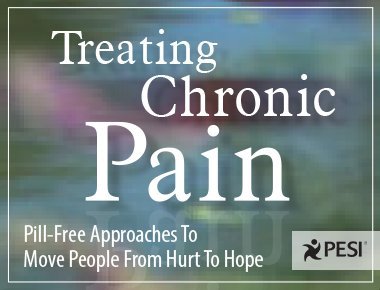Treating Chronic Pain
Pill-Free Approaches to Move People From Hurt To Hope
Martha Teater, MA, LMFT, LCAS, LPC

We are in the midst of a devastating crisis in the U.S. We are witnessing the deadly impact of opioids on individuals and communities. With 129 deaths daily from unintended overdose, deaths from opioid overdoses now far surpass the number of deaths from motor vehicle accidents.
Eighty percent of people who end up having trouble with opioids started with medications initially prescribed by doctors or dentists. Many of these folks have chronic pain, a condition for which opioid treatment is seldom indicated.
My upcoming book, “Treating Chronic Pain: Pill-Free Approaches to Move People from Hurt to Hope,” details non-opioid options for treating chronic pain. Filled with handouts, worksheets, and inventories, the book arms clinicians with powerful tools to use in treating those with pain.
One important section in the book highlights the myth that opioid pain medications are the strongest painkillers we have. That is simply not true.
There are very few scientific studies that compare the use of opioids with non-opioid medications for pain.
It is now clear that the combination of 200-mg ibuprofen taken at the same time as a 500-mg Acetaminophen (Tylenol) is more effective (by far) than any oral opioid.
Take a look at this graph based on information from the Cochrane organization:
 |
One 200-mg ibuprofen is as effective two Percocet pills. Tylenol by itself is better than oxycodone.
There is no evidence of opioid effectiveness for chronic pain. The side effect profile is horrible, it’s incredibly hard to get off opioids, and use of opioids leads to poorer quality of life and, ironically, increased pain.
So what do you do? The treatment of choice for chronic pain is behavioral therapy. We (behavioral health providers) should be in the driver’s seat in chronic pain treatment. Medications and procedures rarely provide the relief being sought.
Use the strategies in this book and provide the most effective—and safest—treatment for your people who are in pain. When you follow our evidence-based interventions, you'll help your clients move from hurt to hope.
 |
Topic: Clinical Psychology and Psychiatry
Tags: How To | Opioid Use Disorder | Overdose | Trauma | Chronic Pain | How to Treat Chronic Pain | Pain


